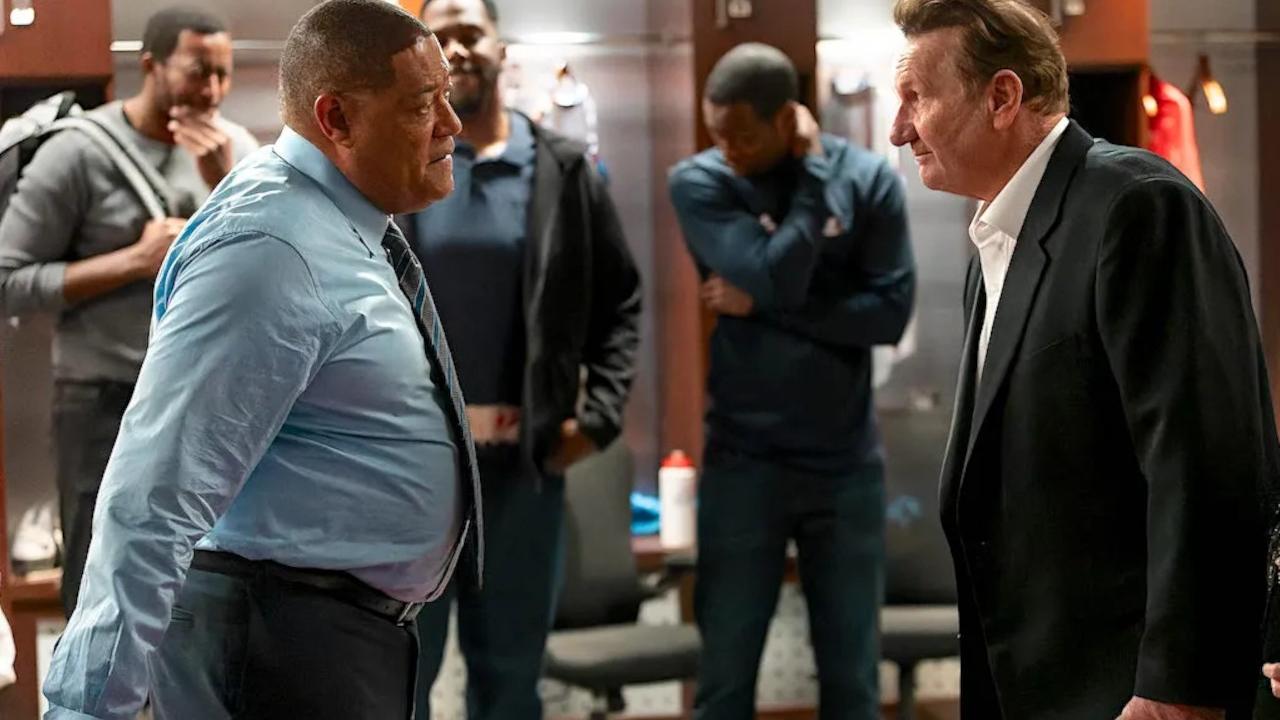Maybe Clipped, FX on Hulu's miniseries about the demise of the Donald Sterling–era Los Angeles Clippers, would make better sense as a show on Lifetime or a Tyler Perry production. In many ways, Clipped is like if a Dateline reenactment segment were extended into a 10-episode prestige television series. Even if we ignore for a second how badly some of the actors portray real-life NBA stars, Clipped would be one of the more ridiculous series on streaming and cable.
With Laurence Fishburne and a spray-painted hairline as Doc Rivers and the carcass of Al Bundy (Ed O'Neill) as Sterling, Clipped follows the buildup and fallout of Sterling's relationship with his personal assistant/sugar-baby V. Stiviano (Cleopatra Coleman), a post-Kardashian emblem who views infamy and fame as synonymous in an online world. Stiviano famously recorded many of her conversations with Sterling, memorably capturing his disgust with her taking photos with black people (specifically Magic Johnson) along with other frank expressions of unadulterated racism. She eventually released these recordings to TMZ, where they went mega-viral, causing embarrassment to the league and dissent within the team and organization. The scandal eventually led to Sterling's banishment from the NBA and the franchise's forced sale to current Clippers owner and resident crazyman Steve Ballmer.
Clipped is a show that is bad at saying many things: about racism and sexism; about the haves and have-nots, the famous and the regular; about internet brain; and about what makes a winning culture. At its best (lol), Clipped attempts to humanize and take seriously the desires, no matter how seemingly frivolous, of multiple people who got caught up in Sterling's bullshit. But most of the time, this is a very milquetoast soap opera with little insight into sports, race, and the actual events that it depicts. On the other hand, it sure does know a lot about memes from 2014.
And yet, for the life of me, I can't give up on it. Perhaps it is an inherent love of trash: pulpy material, actors chewing scenery, purposeful misrepresentations of actual events, I love it all. The bad casting decisions have started to become delightful with the appearance of each next NBA star on the show. O'Neill's Sterling as the most aloof, cantankerously offensive rich oligarch has been more entertaining than not. And I don't want to miss a second of Laurence Fishburne's Lego hair, either.
There's no one thing that I can isolate and tell you is good about this show, but somehow all put together, its ridiculousness mesmerizes me and blows me away. Even the people who were there are amused by its ridiculousness, as evidenced by this clip from LeBron James's podcast partner/coach JJ Redick and Jamal Crawford.
I do have to say, Blake Griffin might be the worst of the casting decisions. Not only is the actor Austin Scott way too scrawny to play the brawny Blake, but I'm pretty sure Griffin, an actor and comedian away from basketball, would've jumped at the chance to play himself.
Honestly, why shouldn't it be ridiculous? Everything about the real-life saga was a showcase of buffoonery, as slapstick as everything else Sterling had run or been involved with. From his slums to the Clippers, Sterling was the worst kind of owner: racist, malevolent, inept, stupid. The audio recordings merely made public and undeniable what was already widely known—and what most owners and members of Sterling's class are probably like. Remembering stuff like the Clippers turning their workout gear inside out as "protest," or the Stiviano interview with Barbara Walters, just reminded me that the whole saga was way funnier than anything this show could write up.
At least with Winning Time, HBO's series about the Showtime-era Lakers, there was a feeling that the people who made that show had a real love for basketball and the Lakers, even if former players didn't see it that way. There was a care and a sense of purpose to its chicanery, even when it didn't always nail the bullseye. Clipped, by contrast, feels tawdry and silly not because that's what the creators love most about this story but because that's what the story itself is: A pathetic chapter closing the end of a certain iteration of the NBA that the league's stewards were ready to move on from. It's cheap nostalgia and cheap entertainment, but dammit, it is entertainment. It's good for some laughs.






